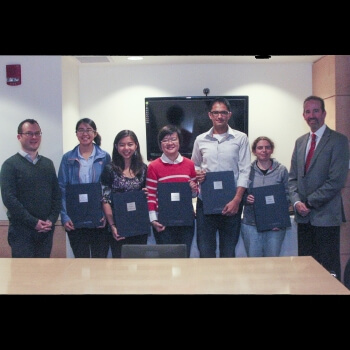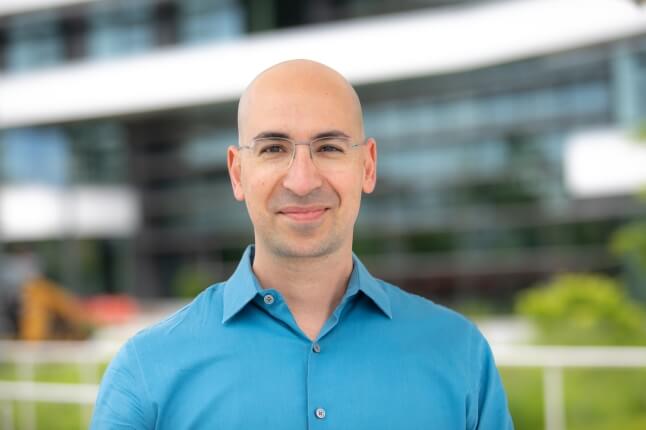News
(From left) Area Dean for Computer Science David Parkes, Pao Siangliulue, Lillian Tsai, Ming Yin, Gaurav Bharaj, Ofra Amir, and Dean Frank Doyle. (Photo by Adam Zewe/SEAS Communications.)
Five computer science graduate students at the Harvard John A. Paulson School of Engineering and Applied Sciences (SEAS) have been named 2017 Siebel Scholars.
Ofra Amir, Gaurav Bharaj, Pao Siangliulue, Lillian Tsai, and Ming Yin will each receive a $35,000 award for their final year of graduate studies.
They are among 92 students selected worldwide from 17 partnering institutions by the Siebel Scholars Foundation, which recognizes exceptional students at the world’s leading graduate schools of computer science, as well as business, bioengineering, and energy science. On average, Siebel Scholars rank in the top 5 percent of their class, and many are within the top 1 percent.
“The Class of 2017 represents the best and brightest from around the globe and it’s my great pleasure to welcome them into this ever-growing, lifelong community,” said Thomas M. Siebel, chairman of the Siebel Scholars Foundation. “The program’s continued expansion into energy science furthers the potential for Siebel Scholars to achieve even more through their work with an incomparable group of equally talented peers.”
The five SEAS students join more than 1,000 Siebel Scholars who are global leaders in academia, government, and industry. Siebel Scholars are chosen by the deans of their respective schools on the basis of outstanding academic achievement and demonstrated leadership qualities.
(From left) SEAS Siebel Scholars Pao Siangliulue, Ming Yin, Lilian Tsai, Ofra Amir, and Gaurav Bharaj. (Photo by Adam Zewe/SEAS Communications.)
Student Biographies
Ofra Amir is a computer science Ph.D. candidate, advised by Barbara Grosz, Higgins Professor of Natural Sciences. Her research combines artificial intelligence and human-computer interaction, focusing on the development of intelligent algorithms and systems for supporting human teamwork. She has published her work in artificial intelligence and human-computer interaction venues, and received honorable mention for best paper at the 2015 Association for Computing Machinery (ACM) Conference on Human Factors in Computing Systems. In addition, Amir interned at the Berkman Center for Internet and Society and Microsoft Research. She also co-chaired the 2015 Association for the Advancement of Artificial Intelligence (AAAI) Spring Symposium on Intelligent Systems for Supporting Distributed Human Teamwork. She holds BSc and MSc degrees in information systems engineering from Ben-Gurion University.
Gaurav Bharaj is a fourth-year doctoral student, pursuing research in computational design and computer graphics. He is advised by Hanspeter Pfister, An Wang Professor of Computer Science. Bharaj seeks to model and create tools for fabrication-ready, functional objects according to user specifications. His research lies at the intersection of computer graphics, applied physics, and mathematical optimization. He has worked as a research engineer at Max-Plank Institute for Informatik in Germany, and served as a research intern at Disney Research, the Adobe Creative Technologies Lab, and the Computational Fabrication Group at MIT. Baraj, who received the Harvard Fellowship for Indian Students from the government of India, holds a master’s degree in computer science from the University of Pennsylvania.
Pao Siangliulue is pursuing a Ph.D. in computer science, advised by Krzysztof Gajos, Gordon McKay Professor of Computer Science. Her research explores the application of intelligent technologies to help people develop and express creative ideas. Her work on tools and interventions to support idea generation in large creative online communities has been published in venues on human-computer interaction and cognition. She organized two AAAI Conference workshops that brought together researchers and industry practitioners to develop concrete ideas for crowdsourcing. Siangliulue has interned at NVIDIA and Adobe. She holds a bachelor’s degree in electrical engineering and a master’s degree in computer science from Stanford University.
Lillian Tsai is pursuing a joint A.B./S.M. degree in computer science and is advised by Eddie Kohler, Microsoft Professor of Computer Science. She currently conducts research as part of an MIT-Harvard team that is designing a software transactional memory. She previously worked on projects ranging in scope from investigating poker-playing strategies with evolutionary algorithms to creating a debugging harness for C++ interfaces. She has served as a teaching fellow for introductory and systems computer science classes at Harvard, providing section materials for other teaching fellows and instructing students. She interned and later contracted for Thumbtack, Inc., where she became the company's expert on the Go programming language and managed its infrastructure on the Amazon Web Service.
Ming Yin is a Ph.D. candidate in computer science, advised by Yiling Chen, Gordon McKay Professor of Computer Science. Her primary research interests lie in the emerging area of human computation and crowdsourcing. The goal of her research is to better understand crowdsourcing as both a new form of production and an exciting opportunity for online experimentation. Her work is published in top venues like AAAI, the International Joint Conference on Artificial Intelligence, and the World Wide Web Conference. She received honorable mention for her research paper at the ACM Conference on Human Factors in Computing Systems. Yin has interned at Microsoft Research New York City, PARC, and Xerox Research. She holds a bachelor’s degree in computer software from Tsinghua University in Beijing.
About the Siebel Foundation
The Siebel Scholars program was founded in 2000 by the Siebel Foundation to recognize the most talented students at the world’s leading graduate schools of business, computer science, bioengineering, and energy science. Today, the foundation's active community of leaders serves as advisors to the Siebel Foundation and works collaboratively to find solutions to society’s most pressing problems.
The Thomas and Stacey Siebel Foundation, a nonprofit, public benefit corporation, was established as a private foundation in 1996. Its mission is to foster programs and organizations that improve the quality of life, environment, and education of its community members. The Siebel Foundation funds projects to support the homeless and underprivileged, educational and research programs, public health, and alternative energy solutions. The Siebel Foundation engages in strategic philanthropy; as such, it does not entertain grant requests, but invests in targeted highly leveraged programs and in projects it founds and operates. For more information, please visit www.SiebelFoundation.org.
Topics: Computer Science, Awards
Cutting-edge science delivered direct to your inbox.
Join the Harvard SEAS mailing list.
Press Contact
Adam Zewe | 617-496-5878 | azewe@seas.harvard.edu



